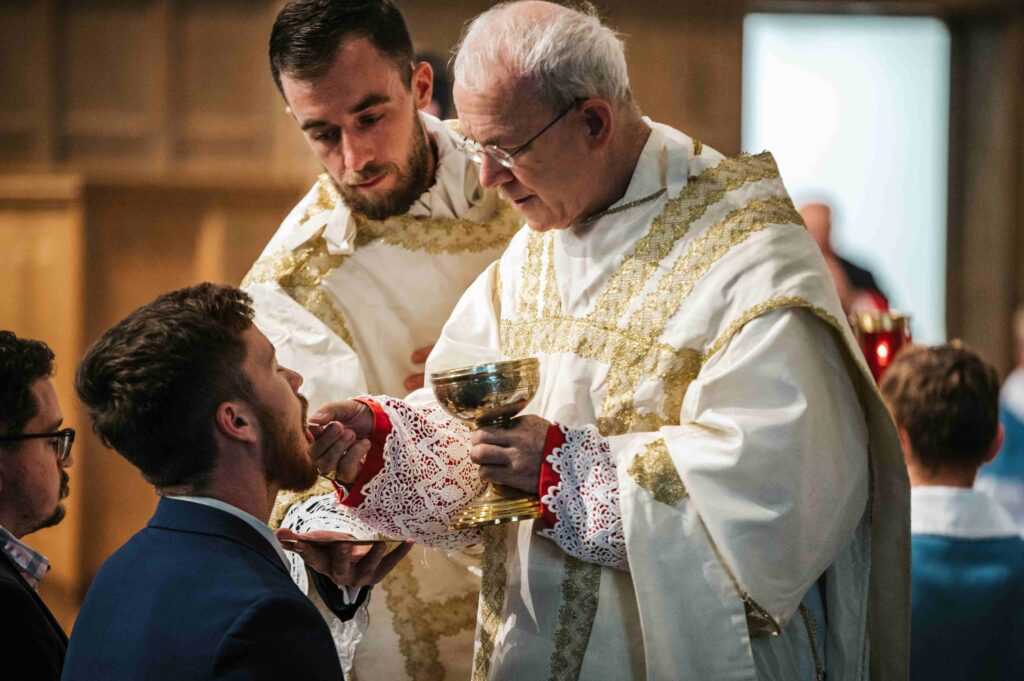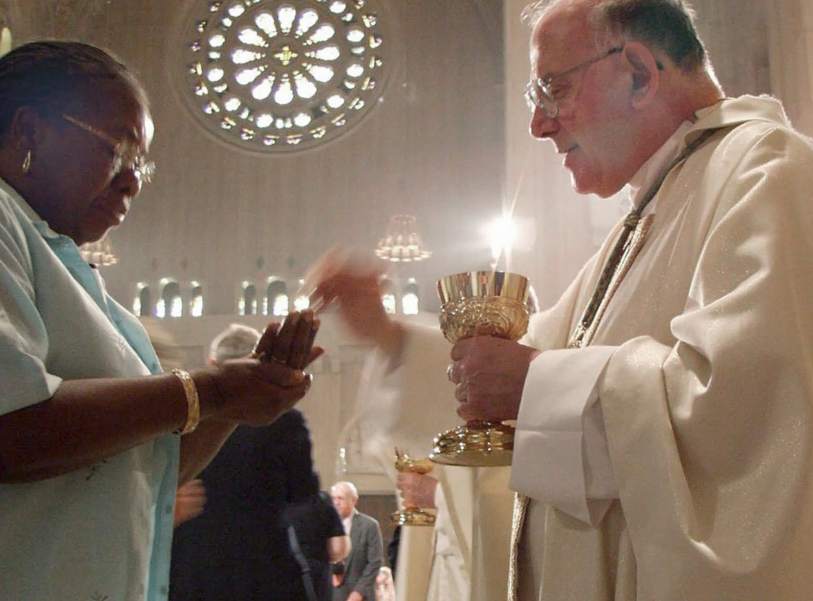Who Can Receive Holy Communion?
In our church, like in many Catholic churches, priests remind participants at a funeral Mass that although visitors who belong to various Christian denominations or other religions are welcomed, only Catholics are allowed to receive Holy Communion. After one funeral, I received a letter from an adult grandson of the deceased. He thanked me for my kind words and noble ceremony; he also expressed some complaints.
He wrote: “I found myself taken aback by what I perceived as a significant departure from what I understand to be biblically accurate Communion practices. During the service, you, Father, conveyed that only Catholics were permitted to partake in Communion, explicitly excluding others from participating in this sacred offering. I believe this approach contradicts the inclusive nature of Communion as intended by Jesus. In my understanding, Communion is not meant to be confined to a specific church or denomination; rather, it is the Lord’s Table, a symbol of unity among born-again believers in fellowship with the Lord and each other.” After several additional arguments, he concluded: “I urge you to reconsider the Communion requirements at Corpus Christi and align them with a more inclusive interpretation of biblical teachings. Embracing a broader perspective on Communion has the potential to bridge gaps, foster understanding, and positively impact those who may be exploring their faith journey.”

In my answer to him, I stated that I believe that his call for inclusivity in receiving Communion originates from his lack of understanding of fundamental Catholic teaching regarding the Eucharist — the Real Presence of Christ in the Eucharist — and the very nature of the Church. So, I offered him the following clarifications:
First, the practices and teaching at Corpus Christi Church are not the practices and teaching of our parish. They came from Apostolic times that later were deepened by the theological works of the saints and theologians like St. Augustine, St. Irenaeus, St. Thomas Aquinas and many others, under the invisible but real guidance of the Holy Spirit. The dogmatic teaching of the Church, including moral teaching, is identical in every Catholic church in the world, whether it is in France, Poland, Africa, China, Chicago, or Carol Stream.
For the first 1,500 years, Christianity existed nearly exclusively as the Catholic Church and the Orthodox Church (with the same theological teaching as the Catholic Church). It is only after the Protestant Reformation in the 16th century that new teaching on the Eucharist was created by various Protestant denominations. Both the Catholic and Orthodox Churches continue with the unchanged 2,000-year-old teaching regarding Jesus’ Real Presence in the Eucharist.
Most Protestant churches (which number more than 20,000 denominations) do not have the Eucharist at all. Although some of them use the word “Eucharist” to describe their religious gatherings/services, it is not the Eucharist, and cannot be, since there is no consecration of the bread to become the Body of Christ. Moreover, they are not able to make a real consecration, since only priests ordained by the bishops in the Catholic Church or the Orthodox Church are able to do so. In addition, many Protestant churches believe that Jesus in the bread is present only symbolically.
It is important to know and understand that people who do not believe in the Real Presence of Jesus and are not in full communion with the Catholic Church cannot receive Communion. The word “communion” itself means “union with.” It would be illogical for them to receive Communion, since receiving it would not be a sign of communion with the Church to which they do not belong to and whose teaching they do not share.
As Catholics, we know that the Eucharist is the very Body and Blood of Jesus Christ. We know that the Real Presence of Christ effected in this Sacrament does not cease once the celebration of the Mass is finished. This is why we worship the Eucharist, genuflecting or bowing deeply, as a sign of adoration of the Lord. Jesus said: “This is my body,” not “This is my body for that moment.”
When a Catholic says, “Amen” to “The Body of Christ,” he or she acknowledges the Eucharist to be the very Body and Blood of Christ and not a mere symbol. At the same time, a Catholic acknowledges and accepts the teachings of the Church and maintains communion or unity with the Church. This is a claim that a non-Catholic cannot genuinely make.

Most non-Catholics and non-Christians do not believe that Holy Communion is the very Body and Blood of the Savior. If one said, “Amen” to “The Body of Christ,” he or she would be speaking falsely. Even if a Protestant does believe that Holy Communion is the very Body and Blood of Christ, that individual could still not honestly say, “Amen” to “The Body of Christ” because he or she has no real intention of maintaining unity with the Catholic Church.
Because the Catholic Church loves and respects all people and their beliefs, we do not share Communion with those who are not in union with us. We want them to remain men and women of integrity. Moreover, Catholics who committed a mortal sin of any kind cannot receive Communion (the Body of Christ) during Mass. St. Paul says, “Whoever, therefore, eats the bread and drinks the cup of the Lord in an unworthy manner will be guilty of profaning the body and blood of the Lord . . . For anyone who eats and drinks without discerning the body, eats and drinks judgment on himself” (I Corinthians 11:27-29).
At the end of my explanation to this man’s letter, I dealt with the word “inclusivity” that he used very frequently as the main reason for allowing all Christians, no matter what denomination, to receive the Body of Christ. I noted that this word “inclusivity” received common recognition in recent years and became so popular in justification of anything in society. As such, this word could have neutral and even positive meaning, but unfortunately, it gained an absolute value and became kind of a “golden calf” that supersedes other values like truth, justice, fairness, and even logic.
For example, today we witness some groups in our society which try to use inclusivity as a weapon to force women to compete in sports with men who claim to be women. With such understanding of inclusivity, even God would be obliged to accept every person into His eternal kingdom, notwithstanding that a person is good or is a villain to prevent being accused of a lack of inclusivity. In fact, the Holy Scripture clearly shows that unrepenting sinners will have no eternal life with God. Fortunately, God has no ambition to please people, like some churches do, but He leads all people to the full truth. For the same reason, the Catholic Church must listen to God and does not “align with a more inclusive interpretation of biblical teachings,” as stated in the letter I received.
Fr. Mark Jurzyk
